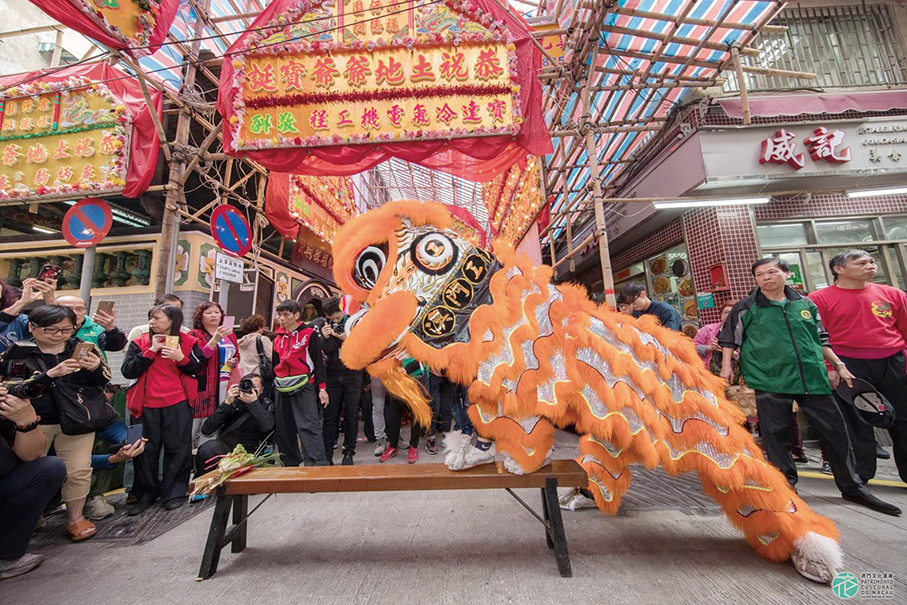The Cultural Affairs Bureau (IC) is proposing to list 12 more items of Macau’s intangible cultural heritage as statutorily protected ones, a 30-day public consultation on which will start next Wednesday.
The bureau made the announcement in a statement yesterday.
This came after the government first classified 12 items in its statutory protection list of intangible cultural heritage list in 2019 since the Cultural Heritage Law took effect in 2014.
According to yesterday’s statement, the 12 newly proposed items of intangible cultural heritage comprise Tou Tei (“Earth God”) Belief and Customs, Dragon Dance, Lion Dance, Portuguese Folk Dance, Spring Festival, Tung Ng (“Double Fifth” –Dragon Boat Festival), Dragon Boat Races, Tai Chi (“Supreme Ultimate”) Martial Arts, Confection of Portuguese-style Egg Tarts, Confection of Almond Cookies, Confection of Traditional Chinese Wedding Cakes, and Preparation of Jook-Sing Noodles. “Jook-Sing” is Chinese of “Bamboo Rise”.
The upcoming public consultation period will run from Wednesday next week through January 2, during which a public session will be held on Saturday next week at the Macau Museum of Art (MAM) in Nape.
The public session will be conducted in Cantonese, with simultaneous interpretation into Putonghua and Portuguese. Sign language will also be available.
The Cultural Heritage Law defines cultural heritage as comprising intangible cultural heritage and tangible cultural heritage that consists of classified immovable properties, i.e., cultural heritage construction structures, and movable properties.
According to the law, which came into force in March 2014, the Cultural Affairs Bureau is required to draw up an inventory of intangible cultural heritage with the aim of ensuring the protection of Macau’s various items of intangible cultural heritage, as well as to update the inventory, i.e., adding items, in compliance with the findings of its latest surveys and research studies.
According to its website, the bureau first put 15 items of intangible cultural heritage into the inventory in 2017, before adding 55 more in 2020, because of which the inventory currently comprises 70 items.
In addition, according to the law, the government is required to decide whether to classify certain intangible cultural heritage items that are already in the Cultural Affairs Bureau’s inventory as statutorily protected ones, officially known as List of Intangible Cultural Heritage.
However, according to the law, the government is required to consult the public about its proposal to list certain intangible cultural heritage items as statutorily protected ones.
In addition to consulting members of the public, the government is also required to consult the Cultural Heritage Council before deciding whether to list the respective items as statutorily protected ones.
After a public consultation process, the government, for the first time, classified 12 items in its List of Intangible Cultural Heritage in December 2019.
The upcoming public consultation will be about the government’s proposal to list 12 more items of intangible cultural heritage as statutorily protected ones.
Items newly classified in the statutorily protected List of Intangible Cultural Heritage must be published in an executive order signed by the secretary for social affairs and culture in the Official Gazette (BO) to take legal effect. Macau currently has 12 statutorily protected intangible cultural heritage items after they were listed in December 2019.
The current 12 statutorily protected items include Cantonese Opera, Patuá Theatre, A-Ma Belief and Customs, and Herbal Tea Brewing.
Patuá is Macau’s highly endangered Portuguese-Asian Creole spoken by its Macanese community and diaspora. Customarily, the term “Macanese” refers to Macau’s community of mixed Portuguese and Asian extraction, which makes up about 1.5 percent of the population.
Details in English about all items listed in the government’s Inventory of Intangible Cultural Heritage can be checked on: https://www.culturalheritage.mo/en/detail/102318, while details about all items listed in its statutorily protected List of Intangible Cultural Heritage can be checked on: https://www.culturalheritage.mo/en/detail/102232

This undated handout photo downloaded from the Cultural Affairs Bureau’s (IC) cultural heritage website yesterday shows a lion dance outside Foc Tac Temple near the Horta da Mitra wet market in celebration of the birth of Tou Tei (“Earth God”).








